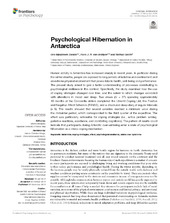| dc.contributor.author | Sandal, Gro Mjeldheim | |
| dc.contributor.author | van de Vijver, Fons J.R. | |
| dc.contributor.author | Smith, Nathan A. | |
| dc.date.accessioned | 2019-06-20T10:56:42Z | |
| dc.date.available | 2019-06-20T10:56:42Z | |
| dc.date.issued | 2018-11-20 | |
| dc.Published | Sandal GM, van de Vijver FJ, Smith NA. Psychological hibernation in Antarctica. Frontiers in Psychology. 2018;9:2235 | eng |
| dc.identifier.issn | 1664-1078 | |
| dc.identifier.uri | https://hdl.handle.net/1956/20281 | |
| dc.description.abstract | Human activity in Antarctica has increased sharply in recent years. In particular during the winter months, people are exposed to long periods of isolation and confinement and an extreme physical environment that poses risks to health, well-being and performance. The present study aimed to gain a better understanding of processes contributing to psychological resilience in this context. Specifically, the study examined how the use of coping strategies changed over time, and the extent to which changes coincided with alterations in mood and sleep. Two crews (N = 27) spending approximately 10 months at the Concordia station completed the Utrecht Coping List, the Positive and Negative Affect Schedule (PANAS), and a structured sleep diary at regular intervals (x 9). The results showed that several variables reached a minimum value during the midwinter period, which corresponded to the third quarter of the expedition. The effect was particularly noticeable for coping strategies (i.e., active problem solving, palliative reactions, avoidance, and comforting cognitions). The pattern of results could indicate that participants during Antarctic over-wintering enter a state of psychological hibernation as a stress coping mechanism. | en_US |
| dc.language.iso | eng | eng |
| dc.publisher | Frontiers | eng |
| dc.rights | Attribution CC BY | eng |
| dc.rights.uri | http://creativecommons.org/licenses/by/4.0 | eng |
| dc.subject | Antarctica | eng |
| dc.subject | coping strategies | eng |
| dc.subject | affect | eng |
| dc.subject | psychological resilience | eng |
| dc.subject | winter-over syndrome | eng |
| dc.title | Psychological hibernation in Antarctica | eng |
| dc.type | Peer reviewed | |
| dc.type | Journal article | |
| dc.date.updated | 2019-02-05T15:54:00Z | |
| dc.description.version | publishedVersion | |
| dc.rights.holder | Copyright 2018 The Author(s) | eng |
| dc.identifier.doi | https://doi.org/10.3389/fpsyg.2018.02235 | |
| dc.identifier.cristin | 1631582 | |
| dc.source.journal | Frontiers in Psychology | |

